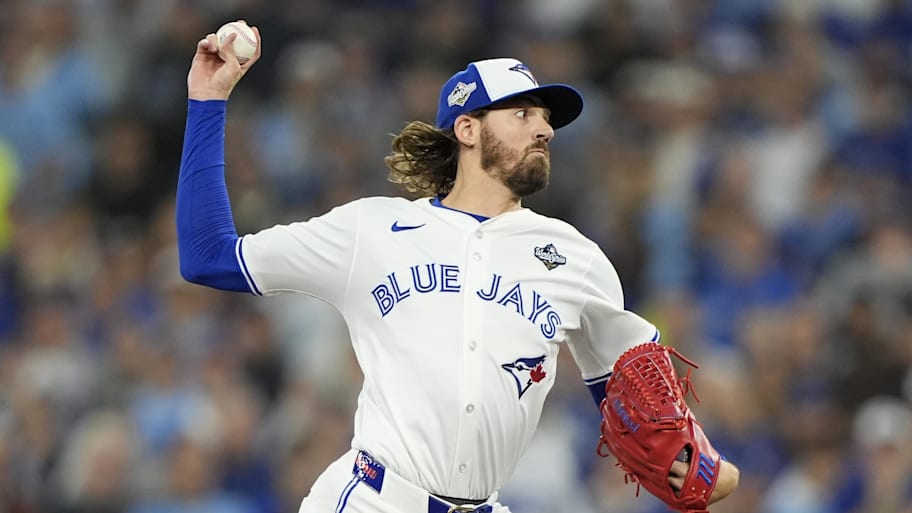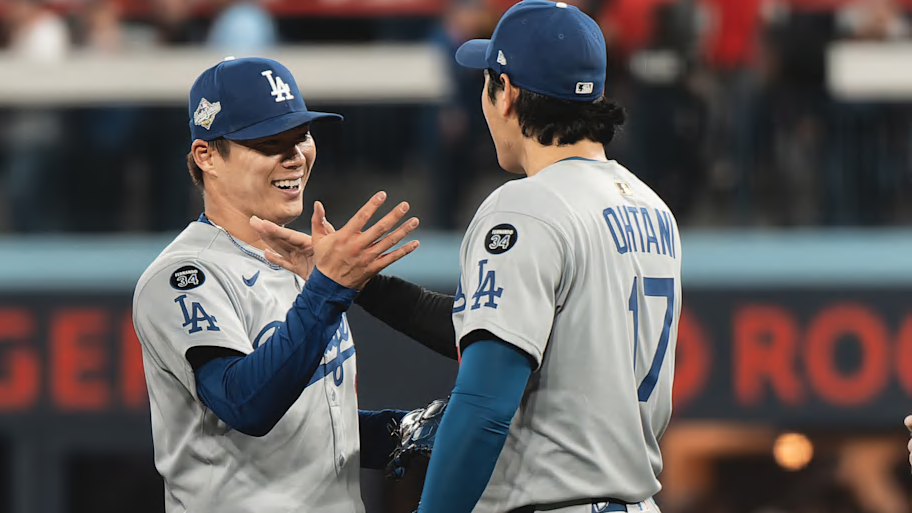TORONTO — The last time Yoshinobu Yamamoto tortured hitters for nine innings, even he seemed impressed. “Wow,” he whispered as he allowed himself a single round of applause into his glove. That was all of 11 days ago.
By the time he did it again Saturday, this time in Game 2 of the World Series against the Blue Jays, he was used to it. As he induced a popout to third for the final out of a 5–1 victory to even the series at a game apiece, he just grinned.
The line—nine innings, eight strikeouts, four hits, no walks—did not quite capture his dominance. The ballpark did. The sellout crowd of 44,607, which shook Rogers Centre in Game 1, was reduced to halfhearted responses to the video board’s exhortations by the seventh inning. Yamamoto retired the last 20 hitters he faced, including striking out the side in the eighth. When Guerrero grounded to first to lead off the ninth, they could barely bring themselves to groan. And when it was over, they just headed for the exits.
It was the first time a pitcher achieved such a feat since Curt Schilling did it for the 2001 Arizona Diamondbacks a remarkable three straight times—in Game 1 of the NLDS, Game 5 of the NLDS and Game 3 of the NLCS—and the first time a pitcher did it on this stage since Orel Hershiser did the same thing for the 1988 Dodgers, in Game 7 of the NLCS, Game 2 of the World Series and Game 5 of the World Series.
Yoshinobu Yamamoto is becoming an October legend before our eyes pic.twitter.com/uugTCFFSe2
— Jomboy Media (@JomboyMedia) October 26, 2025
And Yamamoto did it on a night when he didn’t have his best stuff. His four-seamer, his most trusted of his seven pitches, deserted him, so he largely deserted it, leaning instead on his devastating slider and confounding curveball, with a few cutters, sliders and sinkers mixed in to keep the Blue Jays honest.
At first, they seemed ready for him.
As the series opened, some observers had cast it as a David vs. Goliath battle. The Blue Jays insisted they were not interested in the opinions of anyone outside their clubhouse, but the description still rankled them. Sure, the Dodgers’ payroll ranks No. 1 in the league and its lineup begins with three Hall of Famers—Ohtani, Betts and Freeman. Ohtani chose L.A. over Toronto. But the Blue Jays’ payroll is No. 5, and they recently signed 26-year-old, five-time All-Star first baseman Vladimir Guerrero Jr. to a 14-year, $500 million extension, to lock him in with DH George Springer, the active No. 2 in postseason home runs. (Not for nothing, the Blue Jays also won one more game than the Dodgers did this year.)
“I think so many fans and so many media members will sit here and say, ‘Toronto’s always second place, Toronto’s always third place for these megastars,’” said righty Chris Bassitt before the series started. “They’re second place out of 30 and you’re punishing them for going after megastars and not getting them. I guarantee you there are 20 other organizations wishing they were going after megastars. Just because they’re not getting three, four, five guys, I think it’s ridiculous, because you’ve got Kevin Gausman, you’ve got [José] Berrios, you’ve got Bo [Bichette] here, Vladdy here, George Springer here, Max Scherzer here.
“To sit here and be like, three, four guys didn’t come and you’re supposed to feel bad for that? It’s a big discredit to all the really good players they got to come here.”
So when they exploded for nine runs in the sixth inning of Game 1 to win 11–4, no one in that clubhouse was surprised. Neither were the Dodgers.
“These guys aren’t going to go away,” said Roberts. “They’re very confident. It’s a very talented team.”

The Dodgers opened Game 2 with a run in the first on a Freeman double and a Will Smith RBI single, but the Blue Jays responded immediately.
Springer led off the bottom of the inning with a double and held at third on a Lukes single. Yamamoto wriggled out of the jam, striking out Guerrero on a 3–2 curveball at the knees, inducing a lineout from Kirk and striking out Varsho, but the 23 first-inning pitches Yamamoto threw taxed him. So did having to work around a leadoff single by Clement, generously granted by the official scorer after Freeman overran his 36-foot popup (hit probability, per Statcast: 0%). The Blue Jays finally broke through in the third, after Yamamoto hit Springer with a pitch, allowed a single to Guerrero and then got a sacrifice fly from Varsho. That marked three straight innings in which the leadoff man reached, usually Yamamoto’s strength: In the regular season, the first batter of an inning had a .167 OBP against him, fifth best among pitchers who made at least 20 starts.
Meanwhile, Gausman was baffling the Dodgers. After allowing a run in the first on a double and an RBI single, he retired the next 17 hitters in order, including inducing two popouts by Ohtani to the third baseman in foul territory.
After seven middling years in Baltimore, Atlanta and Cincinnati, Gausman signed with the Giants before the 2020 season and became a completely different pitcher.
“They kind of told me, We want you to be a two-pitch guy with your secondary pitch at the time being a pitch that 90 percent of the league didn’t even throw,” he recalled before Game 1. “I kind of thought they were crazy, to be honest. Didn’t know kind of why they thought it would work.”
But Covid hit and he realized he would only make 10 starts anyway, so he would likely be able to get a job even if the experiment was a disaster. It was a ringing success. “I was three starts in, and I was like, I’m never going to pitch any different than this,” he said. He finished the year with a career-low 3.62 ERA, and he has since been an All-Star twice. Before the 2022 season, he signed a five-year, $110 million contract with Toronto, and for 19 outs on Saturday, he was exactly the big-game pitcher the Blue Jays sought.
But the difference between excelling and falling short is often only inches wide, and so it was for Gausman on Saturday. Smith worked a full count, only the second three-ball count of the night for Gausman, and the pitcher missed his spot with a four-seamer. It was supposed to be outside. It was inside, and then suddenly it was over the wall. A batter later, Gausman made another mistake to Muncy, who was late but muscled the ball into the left-field bullpen anyway.
That was the end of Gausman’s night. The Dodgers tacked on two more against the Blue Jays’ bullpen, but the cushion was not enough for Roberts to turn to his bedraggled unit. He did not even have a reliever up until the ninth, when he told Roki Sasaki—his only reliable bullpen arm—to get warm. But Roberts didn’t need him. All he needed was Yamamoto—again.
More MLB on Sports Illustrated
This article was originally published on www.si.com as Yoshinobu Yamamoto’s Historic Game 2 Gem Evens Up World Series.
